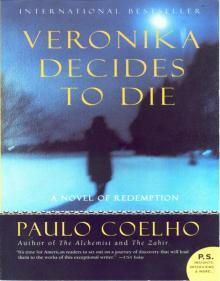- Home
- Paulo Coelho
Veronika Decides to Die: A Novel of Redemption Page 4
Veronika Decides to Die: A Novel of Redemption Read online
Page 4
I must get hold of those pills as soon as possible.
She reflected on her situation there; it was far from ideal. Even if they allowed her to do all the crazy things she wanted to do, she wouldn't know where to start.
She had never done anything crazy.
After some time in the garden, everyone went back to the refectory and had lunch. Immediately afterward, the nurses led both men and women to a huge living room divided into lots of different areas; there were tables, chairs, sofas, a piano, a television, and large windows through which you could see the gray sky and the low clouds. None of the windows had bars on them, because the room opened onto the garden. The doors were closed because of the cold, but all you had to do was turn the handle, and you could go outside again and walk once more among the trees.
Most people went and sat down in front of the television. Others stared into space, others talked in low voices to themselves, but who has not done the same at some moment in their lives? Veronika noticed that the older woman, Mari, was now with a larger group in one of the corners of the vast room. Some other patients were walking nearby, and Veronika tried to join them in order to eavesdrop on what the group members were saying.
She tried to disguise her intentions as best she could, but whenever she came close, they all fell silent and turned as one to look at her.
"What do you want?" said an elderly man, who seemed to be the leader of the Fraternity (if such a group really existed and Zedka was not actually crazier than she seemed).
"Nothing, I was just passing."
They exchanged glances and made a few jerky gestures with their heads. One said to the other: "She was just passing." The other repeated the remark more loudly this time, and soon they were all shouting the same words.
Veronika didn't know what to do and stood there paralyzed with fear. A burly, shifty-looking male nurse came over, wanting to know what was going on.
"Nothing," said one member of the group. "She was just passing. She's standing right there, but she's still just passing."
The whole group burst into laughter. Veronika assumed an ironic air, smiled, turned and moved off, so that no one would notice that her eyes were filling with tears. She went straight out into the garden without bothering to put on a coat or jacket. A nurse tried to persaude her to come back inside, but another appeared soon after and whispered something in his ear. The two of them left her in peace, in the cold. There was no point taking care of someone who was condemned to die.
She was confused, tense, irritated with herself. She had never allowed herself to be provoked; she had learned early that whenever a new situation presented itself, you had to remain cool and distant. Those crazy people, however, had managed to make her feel shame, fear, rage, a desire to murder them all, to wound them with words she hadn't dared to utter.
Perhaps the pills or the treatment they had administered to get her out of her coma had transformed her into a frail woman, incapable of fending for herself. She had confronted far worse situations in her adolescence, and yet for the first time, she had been unable to hold back her tears. She needed to get back to the person she used to be, someone able to respond with irony, to pretend that the insults didn't bother her because she was better than all of them. Who in that group had had the courage to desire death? Who among them could teach her about life when they were all huddled behind the walls of Villete? She would never want to depend on their help for anything, even if she had to wait five or six days to die.
"One day's already gone. There are only another four or five left."
She walked a little, letting the freezing cold enter her body and calm her blood that was flowing too fast. Her heart that was beating too hard.
Honestly, here I am, with my days literally numbered, giving importance to remarks made by people I've never even seen before, people who soon I'll never see again. And yet I suffer and get upset; I want to attack and defend. Why waste my time?
But she was wasting the little time left to her, fighting for her tiny bit of space in that strange community where you had to put up a fight if you didn't want others imposing their rules on you.
I can't believe it, I never used to be like this. I never used to fight over stupid things.
She stopped in the middle of the icy garden. It was precisely because she had found everything so stupid that she had ended up accepting what life had naturally imposed on her. In adolescence she thought it was too early to choose; now, in young adulthood, she was convinced it was too late to change.
And what had she spent all her energies on until then? On trying to ensure that her life continued exactly as it always had. She had given up many of her desires so that her parents would continue to love her as they had when she was a child, even though she knew that real love changes and grows with time and discovers new ways of expressing itself. One day, when she had listened to her mother telling her, in tears, that her marriage was over, Veronika had sought out her father; she had cried, threatened, and finally extracted a promise from him that he would not leave home, never imagining the high price her parents would have to pay for this.
When she decided to get a job, she rejected a tempting offer from a company that had just been set up in her recently created country in favor of a job at the public library, where you didn't earn much money but where you were secure. She went to work every day, always keeping to the same timetable, always making sure she wasn't perceived as a threat by her superiors; she was content; she didn't struggle, and so she didn't grow: All she wanted was her salary at the end of the month.
She rented the room in the convent because the nuns required all tenants to be back at a certain hour, and then they locked the door: Anyone still outside after that had to sleep on the street. She always had a genuine excuse to give boyfriends, so as not to have to spend the night in hotel rooms or strange beds.
When she used to dream of getting married, she imagined herself in a little house outside Ljubljana, with a man quite different from her father--a man who earned enough to support his family, one who would be content just to be with her in a house with an open fire and to look out at the snow-covered mountains.
She had taught herself to give men a precise amount of pleasure; never more, never less, only what was necessary. She didn't get angry with anyone, because that would mean having to react, having to do battle with the enemy and then having to face unforeseen consequences, such as vengeance.
When she had achieved almost everything she wanted in life, she had reached the conclusion that her existence had no meaning, because every day was the same. And she had decided to die.
Veronika went back in and walked over to the group gathered in one corner of the room. The people were talking animatedly but fell silent as soon as she approached.
She went straight over to the oldest man, who seemed to be the leader. Before anyone could stop her, she gave him a resounding slap in the face.
"Aren't you going to react?" she asked out loud, so that everyone in the room could hear her. "Aren't you going to do something?"
"No," the man said and passed a hand over his face. A little thread of blood ran from his nose. "You won't be troubling us for very long."
She left the living room and went triumphantly back to her ward. She had done something that she had never done in her entire life.
Three days had passed since the incident with the group that Zedka called the Fraternity. Veronika regretted that slap, not because she was afraid of the man's reaction but because she had done something different. If she wasn't careful, she might end up convinced that life was worth living, and that would cause her pointless pain, since she would soon have to leave this world anyway.
Her only option was to keep away from everything and everyone, to try to be in every way as she had been before, to obey Villete's rules and regulations. She adapted herself to the routine imposed by the hospital: rising early, eating breakfast, going for a walk in the garden, having lunch, going to the living room,
for another walk in the garden, then supper, television, and bed.
Before Veronika went to sleep, a nurse always appeared with medication. All the other women took pills; Veronika was the only one who was given an injection. She never complained; she just wanted to know why she was given so many sedatives, since she had never had any problems sleeping. They explained that the injection was not a sedative but medication for her heart.
And so, by falling in with that routine, her days in the hospital all began to seem the same. When the days are all the same, they pass more quickly; in another two or three days she would no longer have to brush her teeth or comb her hair. Veronika noticed her heart growing rapidly weaker: She easily ran out of breath, she got pains in her chest, she had no appetite, and the slightest effort made her dizzy.
After the incident with the Fraternity, she had sometimes thought: If I had a choice, if I had understood earlier that the reason my days were all the same was because I wanted them like that, perhaps...
But the reply was always the same: There is no perhaps, because there is no choice. And her inner peace returned, because everything had already been decided.
During this period she formed a relationship with Zedka (not a friendship, because friendship requires a lot of time spent together, and that wouldn't be possible). They used to play cards--which helps the time pass more rapidly--and sometimes they would walk together in silence in the garden.
On one particular morning, immediately after breakfast, they all went out to take the sun, as the regulations demanded. A nurse, however, asked Zedka to go back to the ward, because it was her treatment day.
Veronika, who was having breakfast with her, heard the request.
"What treatment's that?"
"It's an old treatment, from the sixties, but the doctors think it might hasten my recovery. Do you want to come and watch?"
"You said you were depressed. Isn't taking the medication enough to replace the chemical you're lacking?"
"Do you want to watch?" insisted Zedka.
She was going to step outside the routine, thought Veronika. She was going to discover new things, when she didn't need to learn anything more--all she needed was patience. But her curiosity got the better of her and she nodded.
"This isn't a show, you know," said the nurse. "She's going to die. She's hardly seen anything. Let her come with us."
Veronika watched the woman, still smiling, being strapped to the bed.
TELL HER what's going on," said Zedka to the male nurse. "Otherwise she'll be frightened."
He turned and showed Veronika the syringe. He seemed pleased to be treated like a doctor explaining to a younger doctor the correct procedures and the proper treatments.
"This syringe contains a dose of insulin," he said, speaking in a grave, technical tone of voice. "It's used by diabetics to combat high blood glucose. However, when the dose is much larger than normal, the consequent drop in blood glucose provokes a state of coma."
He tapped the needle lightly, to get rid of any air, and then stuck it in a vein in Zedka's foot.
"That's what's going to happen now. She's going to enter a state of induced coma. Don't be frightened if her eyes glaze, and don't expect her to recognize you when she's under the effects of the medication."
"That's awful, inhuman," Veronika said. "People struggle to get out of a coma, not to go into one."
"People struggle to live, not to commit suicide," replied the nurse, but Veronika ignored the remark. "And a state of coma allows the organism to rest; its functions are all drastically reduced, and any existing tension disappears."
He continued to inject the liquid while he was talking, and Zedka's eyes were growing dull.
"Don't worry," Veronika was saying to her. "You're absolutely normal; the story you told me about the king..."
"Don't waste your time. She can't hear you anymore."
The woman on the bed, who a few minutes before had seemed so lucid and full of life, now had her eyes fixed on some point in the distance, and liquid was bubbling from one corner of her mouth.
"What did you do?!" she shouted at the nurse.
"Just my job."
Veronika started calling to Zedka, shouting, threatening that she would go to the police, the press, the human rights organizations.
"Calm down. You may be in a mental hospital, but you still have to abide by certain rules."
She saw that the man was utterly serious, and she was afraid. But since she had nothing to lose, she went on shouting.
From where she was, Zedka could see the ward and the beds, all empty except for one, to which her body was strapped, and beside which a girl was standing, staring in horror. The girl didn't know that the person in the bed was still alive with all her biological functions working perfectly, but that her soul was flying, almost touching the ceiling, experiencing a sense of profound peace.
ZEDKA WAS making an astral journey, something that had been a surprise during her first experience of insulin shock. She hadn't mentioned it to anyone; she was only there to be cured of depression and, as soon as she was in a fit state, she hoped to leave that place forever. If she started telling them that she had left her body, they would think she was crazier than when she had entered Villete. However, as soon as she had returned to her body, she began reading up on both subjects: insulin shock and that strange feeling of floating in space.
There wasn't much written about the treatment. It had been used for the first time around 1930 but had been completely banned in psychiatric hospitals because of the possibility of irreversible damage to the patient. During one such session she had visited Dr. Igor's office in her astral form, at precisely the moment when he was discussing the subject with one of the owners of the hospital. "It's a crime," Dr. Igor was saying. "Yes, but it's cheap and it's quick!" replied the other man. "Anyway, who's interested in the rights of the insane? No one's going to complain."
Even so, some doctors still considered it a quick way of treating depression. Zedka had sought out and borrowed everything that had been written about insulin shock, especially firsthand reports by patients who had experienced it. The story was always the same: horrors and more horrors; not one of them had experienced anything resembling what she was living through at that moment.
She concluded--quite rightly--that there was no relationship between insulin and the feeling that her consciousness was leaving her body. On the contrary, the tendency with that kind of treatment was to diminish the patient's mental capacity.
She started researching the existence of the soul, read a few books on occultism, and then one day she stumbled on a vast literature that described exactly what she was experiencing: It was called "astral travel," and many people had already had the same experience. Some had merely set out to describe what they had felt, while others had developed techniques to provoke it. Zedka now knew those techniques by heart, and she used them every night to go wherever she wished.
The descriptions of those experiences and visions varied, but they all had certain points in common: the strange, irritating noise that preceded the separation of the body from the spirit, followed by a shock, a rapid loss of consciousness, and then the peace and joy of floating in the air, attached to the body by a silvery cord, a cord that could be stretched indefinitely, although there were legends (in books, of course) that said the person would die if they allowed that silver thread to break.
Her experience, however, showed that she could go as far as she wanted and the cord never broke. But generally speaking the books had been very useful in teaching her how to get more and more out of her astral traveling. She had learned, for example, that when she wanted to move from one place to another, she had to concentrate on projecting herself into space, imagining exactly where she wanted to go. Unlike the routes followed by planes--which leave from one place and fly the necessary distance to reach another--an astral journey was made through mysterious tunnels. You imagined yourself in a place, you entered the appropriate tunne
l at a terrifying speed, and the other place would appear.
It was through books too that she had lost her fear of the creatures inhabiting space. Today there was no one else in the ward. The first time she had left her body, however, she had found a lot of people watching her, amused by her look of surprise.
Her first reaction was to assume that these were dead people, ghosts haunting the hospital. Then, with the help of books and of her own experience, she realized that, although there were a few disembodied spirits wandering about there, among them were people as alive as she was, who had either developed the technique of leaving their bodies or who were not even aware of what was happening to them because, in some other part of the world, they were sleeping deeply while their spirits roamed freely abroad.
Today--knowing that this was her last astral journey on insulin, because she had just been to visit Dr. Igor's office and overheard him saying he was ready to release her--she decided to remain inside Villete. From the moment she went out through the main gate, she would never again return, not even in spirit, and she wanted to say good-bye.
To say good-bye. That was the really difficult part. Once in a mental hospital, a person grows used to the freedom that exists in the world of insanity and becomes addicted to it. You no longer have to take on responsibilities, to struggle to earn your daily bread, to be bothered with repetitive, mundane tasks. You could spend hours looking at a picture or making absurd doodles. Everything is tolerated because, after all, the person is mentally ill. As she herself had the occasion to observe, most of the inmates showed a marked improvement once they entered the hospital. They no longer had to hide their symptoms, and the "family" atmosphere helped them to accept their own neuroses and psychoses.
At the beginning Zedka had been fascinated by Villete and had even considered joining the Fraternity once she was cured. But she realized that if she was sensible, she could continue doing everything she enjoyed doing outside, as long as she dealt with the challenges of daily life. As someone had said, all you had to do was to keep your insanity under control. You could cry, get worried or angry like any other normal human being, as long as you remembered that, up above, your spirit was laughing out loud at all those thorny situations.

 The Alchemist
The Alchemist Maktub
Maktub Like the Flowing River
Like the Flowing River The Winner Stands Alone
The Winner Stands Alone The Spy
The Spy By the River Piedra I Sat Down and Wept: A Novel of Forgiveness
By the River Piedra I Sat Down and Wept: A Novel of Forgiveness Eleven Minutes
Eleven Minutes Manuscript Found in Accra
Manuscript Found in Accra Warrior of the Light
Warrior of the Light Veronika Decides to Die: A Novel of Redemption
Veronika Decides to Die: A Novel of Redemption The Devil and Miss Prym: A Novel of Temptation
The Devil and Miss Prym: A Novel of Temptation The Valkyries: An Encounter With Angels
The Valkyries: An Encounter With Angels Brida: A Novel
Brida: A Novel Fifth Mountain: A Novel
Fifth Mountain: A Novel Adultery
Adultery Inspirations
Inspirations The Archer
The Archer The Witch of Portobello
The Witch of Portobello The Pilgrimage
The Pilgrimage The Zahir
The Zahir Brida
Brida The Fifth Mountain
The Fifth Mountain Like the Flowing River: Thoughts and Reflections
Like the Flowing River: Thoughts and Reflections Manual of the Warrior of Light
Manual of the Warrior of Light By The River Piedra I Sat Down & Wept
By The River Piedra I Sat Down & Wept The Supreme Gift
The Supreme Gift Aleph
Aleph Hippie
Hippie Witch of Portobello
Witch of Portobello The Devil and Miss Prym
The Devil and Miss Prym The Alchemist - 10th Anniversary Edition
The Alchemist - 10th Anniversary Edition The Valkyries
The Valkyries